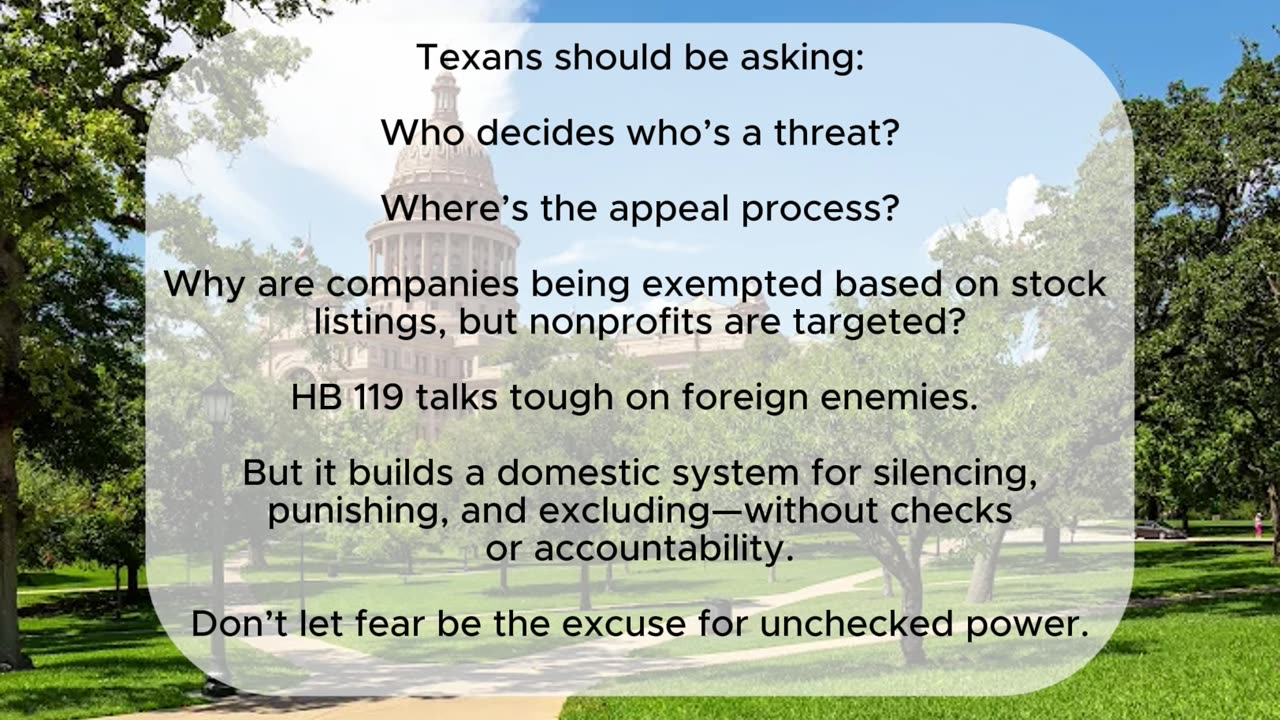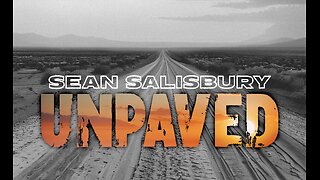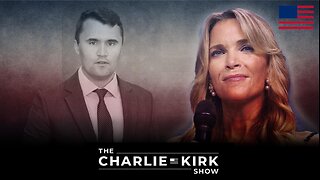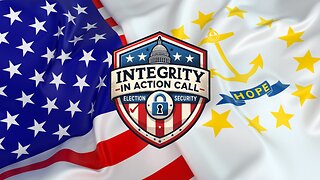Premium Only Content

HB 119
"🔴 What HB 119 Really Does—and Why It’s a Power Move in Disguise
HB 119 was pitched as a national security measure to keep foreign governments from influencing Texas policy. That sounds reasonable. Nobody wants a hostile regime buying off lobbyists in Austin.
But when you read the full thing—it’s not just about foreign agents. It’s about giving state officials new powers to blacklist people, control speech, and bypass oversight.
✅ What it says it does:
HB 119 says if you’re lobbying on behalf of a “foreign adversary,” you have to register—and you’re banned from getting paid.
On the surface? Seems smart. Most Texans agree: foreign influence in government is a bad idea.
❗But here’s what it actually does—especially after the Senate got hold of it:
The Governor can now decide who’s a “foreign adversary.”
Not just countries like China or Russia. Any group, business, or nonprofit—domestic or international—can be blacklisted if the Governor says so. No hearings. No public notice. No way to challenge it.
You can be punished for who you’re connected to.
The bill doesn’t just cover people who work for foreign governments. It includes family members, former officials, and people loosely affiliated with foreign-owned businesses. Even indirect or “in-kind” payments are banned—which is vague and dangerously broad.
No due process. No appeal.
If you get flagged under HB 119, you could be fined $10,000 and forced to give back everything you earned—without any formal process to defend yourself. One agency (the Attorney General’s office) decides it all.
Enforcement = revenue, with no audit trail.
The AG gets to keep the money from fines and recoveries—but there’s no reporting requirement, no budget check, and no review from the State Auditor. That’s a setup for abuse.
🏛️ Who benefits from this bill?
Politicians who want more executive power
Enforcement offices who gain cashflow and discretion
Security contractors like State Armor, who stand to profit from compliance consulting and risk mitigation work
Political groups that want to sideline international perspectives or advocacy work they don’t agree with
🚫 Who’s at risk?
Small firms or nonprofits that work internationally—even if they do public health, education, or trade
Texans with immigrant backgrounds who have ties to foreign businesses or family
Policy advocates, lawyers, or academics doing global work
Anyone who’s seen as “foreign-connected” and politically inconvenient
This isn’t just about foreign policy—it’s about selective enforcement and centralized control.
🔮 Why this sets a dangerous precedent:
HB 119 opens the door for future laws that blacklist, silence, or penalize based on association—not action. Today, it’s foreign lobbying. Tomorrow, it could be journalism, education, or even faith-based international work.
The structure is already in place: all it takes is a new label from the Governor.
💬 Why this matters for regular Texans:
No matter how patriotic you are, no one should lose their right to work, speak, or participate in public life because of who they’re related to or where they used to work. This bill gives too much unchecked power to a few state officials—with no oversight and no accountability.
It talks tough on security. But it walks quietly past your rights.
🔴 #HB119 #TexasPolicy #StayInformed #WatchTheDetails"
-
![[Ep 751] Jimmy Kimmel – You’re Fired! | Freedom of Speech is Not Freedom From Consequence](https://1a-1791.com/video/fww1/bd/s8/1/e/-/h/j/e-hjz.0kob-small-Ep-751-Jimmy-Kimmel-Youre-F.jpg) LIVE
LIVE
The Nunn Report - w/ Dan Nunn
1 hour ago[Ep 751] Jimmy Kimmel – You’re Fired! | Freedom of Speech is Not Freedom From Consequence
271 watching -
 1:28:39
1:28:39
Sean Unpaved
4 hours agoBills-Dolphins TNF Battle, Steelers' D in Crisis, & Coaching Hot Seat Alert!
18.9K1 -
 59:58
59:58
Human Events Daily with Jack Posobiec
3 hours agoHUMAN EVENTS DAILY WITH JACK POSOBIEC
18.9K29 -
 1:12:48
1:12:48
LindellTV
2 hours agoTHE MIKE LINDELL SHOW: JIMMY KIMMEL SUSPENDED
11.9K4 -
 1:57:27
1:57:27
The Charlie Kirk Show
4 hours agoMegyn Kelly Remembers Charlie + Jimmy Kimmel Off the Air | 9.18.2025
284K95 -
 LIVE
LIVE
SternAmerican
1 day agoElection Integrity Call – Thurs, Sept 18 · 2 PM EST | Featuring Rhode Island
102 watching -
 4:22
4:22
Michael Heaver
4 hours agoLabour Face Brutal UK WIPEOUT
17.7K5 -
 10:32
10:32
Faith Frontline
19 hours agoKenneth Copeland EXPOSED as America’s CREEPIEST Pastor Yet
14.5K19 -
 4:33:50
4:33:50
Right Side Broadcasting Network
23 hours agoLIVE REPLAY: President Trump Holds a Press Conference with Prime Minister Keir Starmer - 9/18/25
87.6K43 -
 1:01:35
1:01:35
The Rubin Report
5 hours agoJimmy Kimmel Humiliated as NY Post Exposes His Dark Reaction to Being Canceled
78.1K129